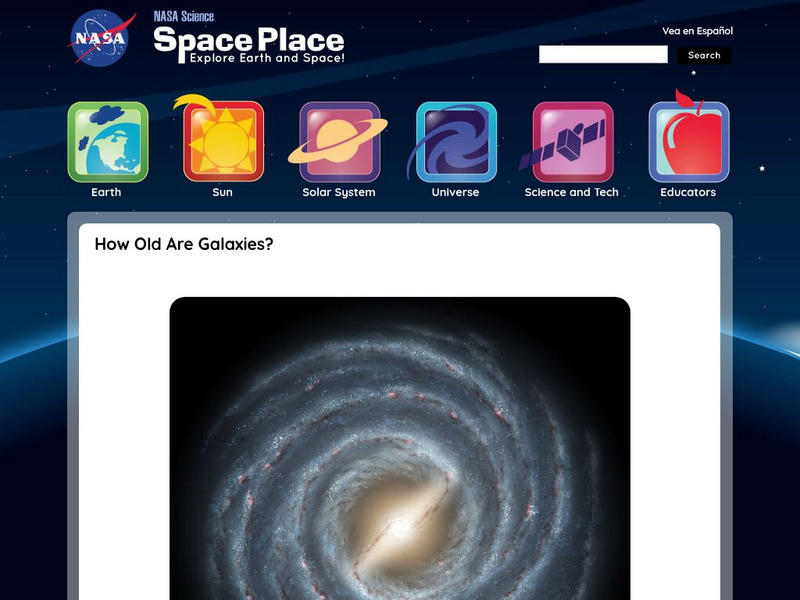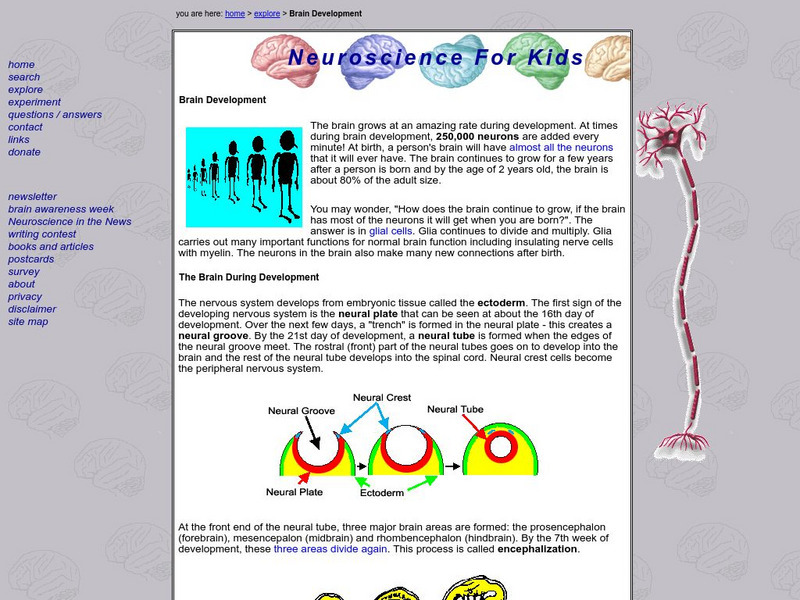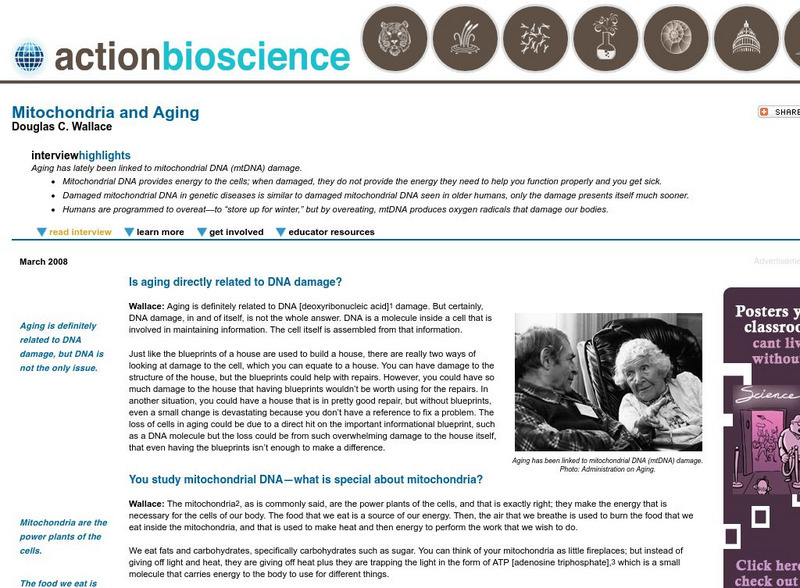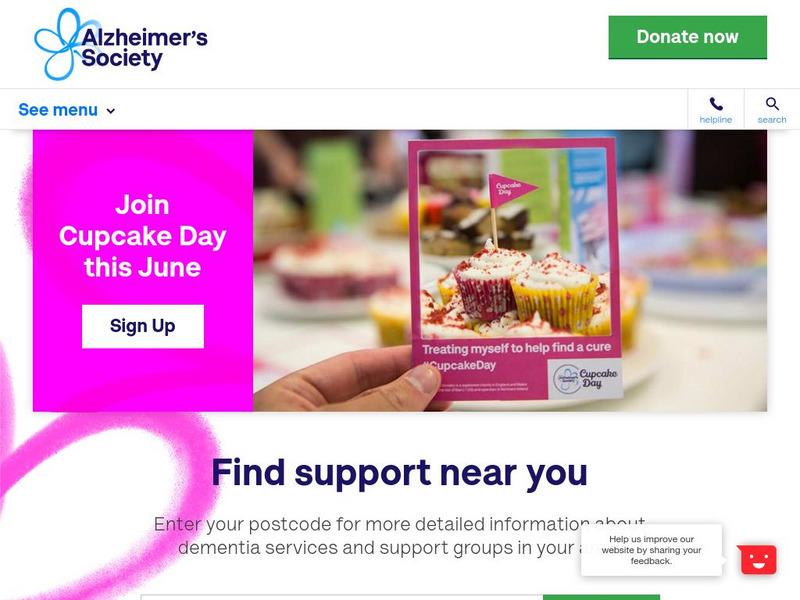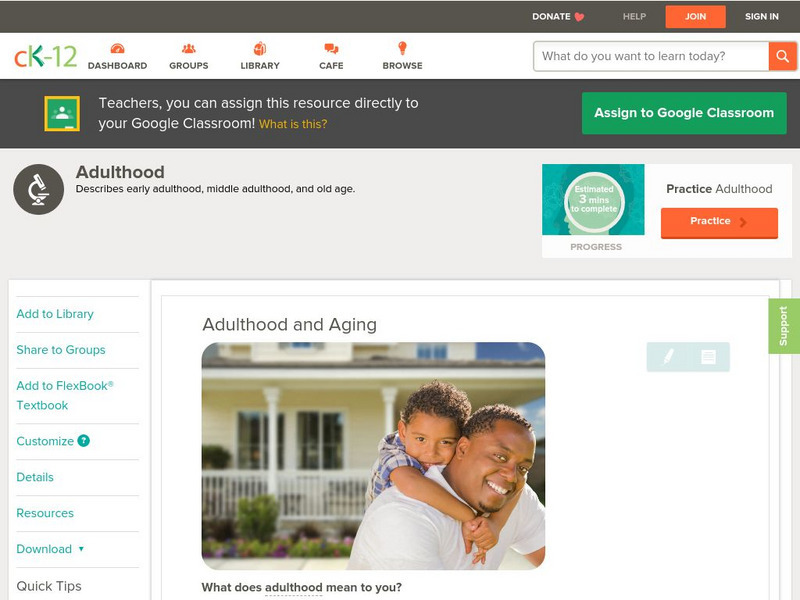Harvard University
Harvard University: Neurosurgical Service
This site from Harvard University offers a rating system of diagnosing Parkinson's Disease. It also presents the Unified Parkinson Disease Rating Scale (UPDRS) which measures mentation, behavior and mood, activities in daily life and...
Scientific American
Scientific American: Cause of Werner Syndrome & Progeria
This "Ask the Experts" article answers the question, "What do we know about the cause of Werner syndrome and progeria, the disease that leads to premature aging in children?" This article also distinguishes between Hutchinson-Gilford...
NASA
Nasa: The Space Place: How Old Do I Look?
Find out how the Galex space telescope is determining the age of galaxies using red-shifted light. View pictures taken by Galex. This resource also has a game which involves determining the ages of objects.
Other
Helpguide: Understand, Prevent and Resolve Life's Challenges
Professional and unbiased information for those seeking knowledge regarding a particular area of health and wellness. Modules are broken down into aging, children and family, healthy lifestyles and mental health. Comprehensive and...
Other
Lucas Publishing: Today's Grandparent Magazine: Newstand
A bi-monthly Canadian magazine for people 50 years old and up. Covers a wide range of topics on aging, grandparenting, family relationships, health, etc. Past issues going back to 2011 can be downloaded in PDF format on this page.
WebMD
Web Md: Hutchinson Gilford Progeria
This site from WebMD Health provides great information on the Hutchinson Gilford Progeria Syndrome. It discusses synonyms, disorder subdivisions, and general discussion with resources. Links are provided throughout for additional...
University of Illinois
University of Illinois Extension: Walk in My Shoes
Through activities, learn what it feels like to be older and what happens to our bodies as we age.
National Institutes of Health
Niaaa: Aging and Alcohol Abuse
This website, which focuses on alcohol abuse in older adults, is organized into the following sections: "Physical Effects of Alcohol," "Mixing Drugs," "Who Becomes A Problem Drinker?" "How to Recognize A Drinking Problem," "Getting...
Other
Socialworksearch: Generativity vs. Stagnation: The Best Has Yet to Come
This is a touching article about generativity, with a personal twist.
University of Washington
Neuroscience for Kids: Brain Development
A good site that covers the development of the brain prior to and following birth.
US Senate
U.s. Senate Special Committee on Aging
Use this resource to learn more about the Special Committee on Aging. This committee is facing many challenges including, Medicare, prescription drugs, Social Security, the Older Americans Act, and long-term care.
American Institute of Biological Sciences
Action Bioscience: Mitochondria and Aging
Following extensive research done by Dr. Douglas Wallace of the University of California, Irvine, it has been discovered that mitochondial genes affect the aging process. In an interview with the genetics scientist details are shared...
University of Wisconsin
The Why Files: Old Brains New Tricks
Can you teach an old brain new tricks? The Why Files have organized a site that discusses the effect of aging on the brain's learning capability.
Rong-Chang ESL
Esl: English for Intermediate Learners (2): Getting Older but Not Sitting Around
This site, geared toward English as a Second Language students, provides "Getting Older But Not Sitting Around" as a reading exercise and audio translation. Multiple choice questions, vocabulary practice, close exercises, crosswords,...
TED Talks
Ted: Ted Ed: Your Body's Real Age
Do all of your cells get switched out for new ones every seven years or so? Does anything remain with you throughout your entire life? These are the questions addressed by NPR's Skunk Bear. [3:09]
TED Talks
Ted: Ted Ed: Why Do Our Bodies Age?
Human bodies aren't built for extreme aging: our capacity is set at about 90 years. But what does aging really mean, and how does it counteract the body's efforts to stay alive? Monica Menesini details the nine physiological traits that...
Other
Administration on Aging: Key Indicators of Well Being
This site reports on older Americans and how to tell what their health status is. A good site for preventative health care and to research geriatric health.
Other
U.s. News: Health
Health articles on diseases, medications, hospitals, diet and nutrition, and aging are updated daily from U.S. News & World Report.
National Health Museum
Access Excellence: The Mysteries of Aging: Is Diet a Contributing Factor?
An interesting article that discusses effects of diet on senescence (the deteriorative aspect of aging). Dietary restriction is found to slow senescence in lab rats.
Other
Newsbreak Special Health Report on the Brain and Aging
This article discusses the relationship between memory and the aging of the brain.
Other
Alzheimer's Society: Alzheimer's Dementia Care and Research
This organization campaigns for a better public understanding of Alzheimer's. In all of their work they strive to listen to the views of people with Alzheimer's and their caregivers. Site has extensive information on dementia. Be sure to...
CK-12 Foundation
Ck 12: Life Science: Adulthood and Aging
[Free Registration/Login may be required to access all resource tools.] When is a person considered an adult? That depends. Most teens become physically mature by the age of 16 or so. But they are not adults in a legal sense until they...
Other
Department of Health and Ageing: Home Page
This is the home page of the Department of Health and Ageing. It is an excellent resource for information on care, services, legislation, policies, contacts, and more for the older community and their caretakers.
American-Israeli Cooperative Enterprise
Jewish Virtual Library: Un Partition Plan, September 1947
This authentic UN map depicts the political lines to be drawn to partition Palestine as established in 1947.




